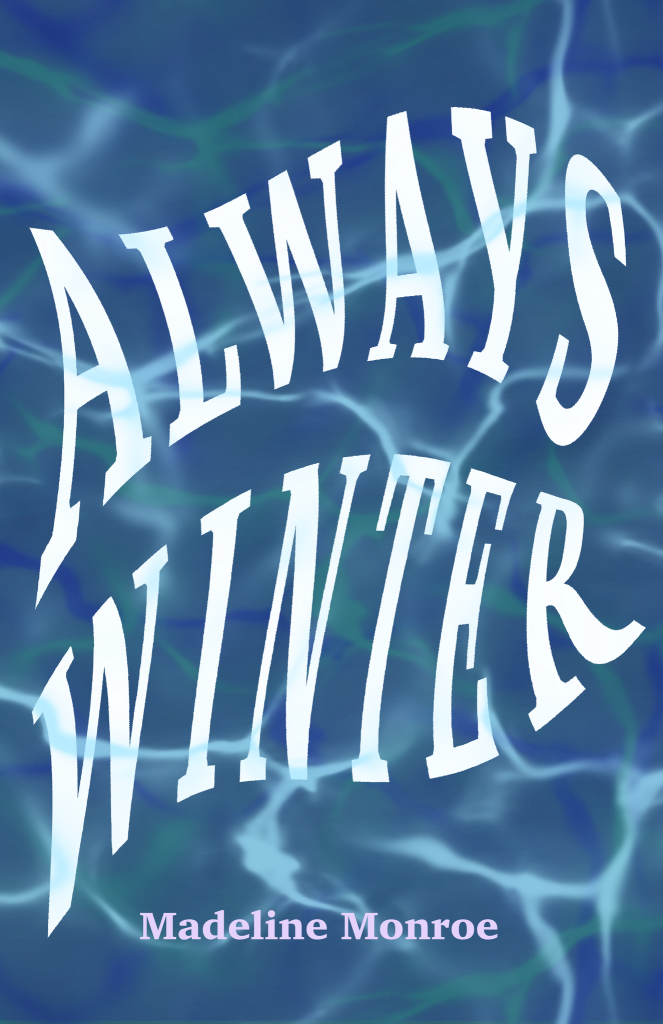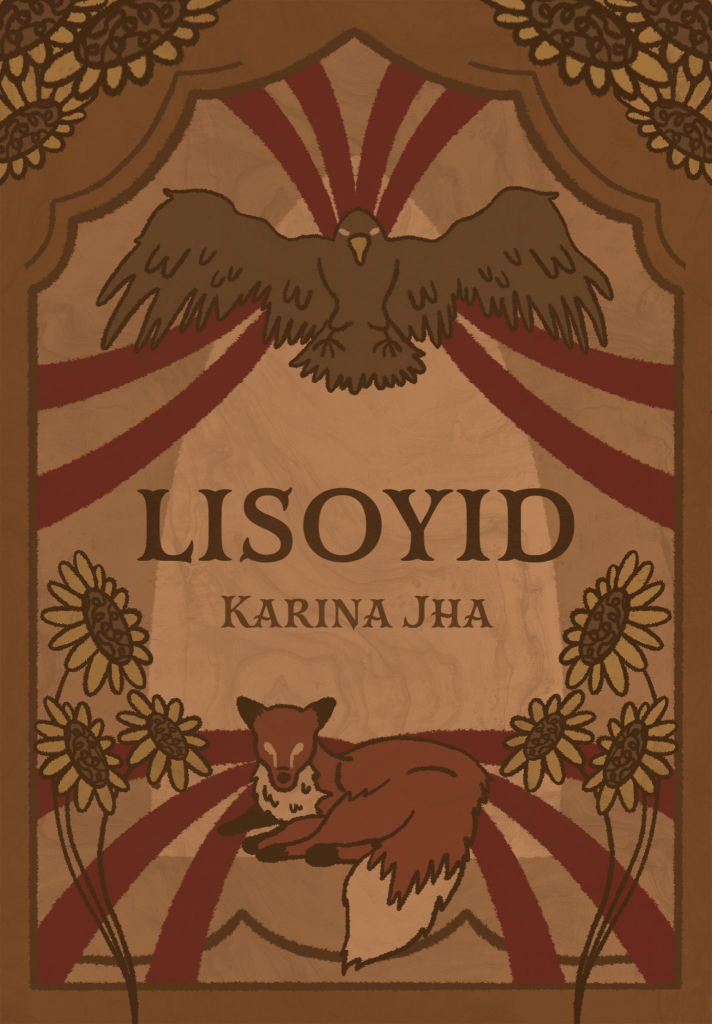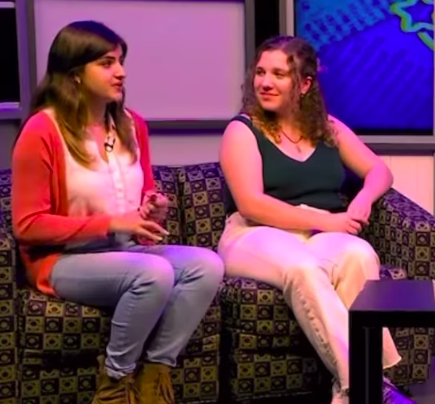Keep the Faucet Running: A Chat with Wilde Press’s Fall 2022 Authors
For many writers, our dream is to get a book published. Undergraduate Students for Publishing was able to make that happen for our two Fall 2022 student authors Karina Jha and Maddy Monroe through Wilde Press, Emerson’s student-run publishing company. I had the privilege of chatting with these authors the week before our launch event (December 8 in the Semel Theatre) about their writing processes and inspiration for their work. Plus, they both gave amazing advice to other writers who want to write their own novels!
Always Winter
Always Winter was written by Maddy Monroe, a sophomore Creative Writing major with a psychology minor. For her, writing wasn’t always the endgame: she started writing in middle school, but not until sophomore year of high school did she ever consider writing as a career path. Majoring in Creative Writing was a decision that she struggled with, but it paid off, and last semester, she wrote are now the first ten pages of Always Winter for a class. All through the summer, she lengthened the piece, finishing her first draft a couple of months before Fall semester began. Within a month, it was edited by her, submitted, and chosen to be published by Wilde Press.

The story is an adult drama that features Maeve and Ethan, an unlikely pair exploring their relationship in a new environment. Monroe discussed her personal draw to the YA genre, and how she struggled to read the genre after attending college. We often read what we relate to, and as we grow older, the genres that have our hearts simply feature events that we don’t experience anymore. This led her to explore a college-aged cast realizing that the relationships they developed are not as clear-cut as they think they are.
Relationships are one of the main themes in this book, especially flawed ones. “You get to college, and you realize a lot of relationships are just flawed—your own, your friends—and I wanted to represent that because sometimes we look at a relationship as flawed and sometimes we feel like the love is not as valid, but that’s just not true,” Monroe said of her main characters Maeve and Ethan. In the romance and drama genres, characters can lose their humanity, and this is what she hoped to maintain with her protagonists; they are meant to represent that a relationship will not always be “good,” and this is more realistic than the perfectionistic couples that plague the romance genre today. She seeks to redefine what should and shouldn’t be, hoping that her readers will learn that we put too much emphasis on what others say we should or shouldn’t do, and instead, it is better to focus on what makes us feel happy and safe.
Safety is an important feeling for college students in a world of change, which Monroe represents with the title of her book. The title, taken from a line in the first chapter (“When it comes to Maeve and Ethan, it was always winter”) encapsulates the image of two characters with a cold background in a newer, warmer space. This is meant literally with the book being set in Mexico and their relationship being built off of their experiences growing up in Minneapolis; it is also meant to figuratively represent the transplantation of existence that college students grapple with as they enter new places in their lives, knowing that some parts of you will always be homages to your upbringing even as you develop and grow.
On the darker side of her book (spoilers ahead), a main conflict is the struggle with substance abuse, something college students are intimately familiar with. This concept was not one that she had planned to introduce into the storyline—her original idea was a cheating arc, but she didn’t want to write a story where the reader would sympathize with the cheater. Instead, she focused on substance abuse: “The fentanyl crisis is going on, and I have a lot of friends back home who are—not to throw them under the bus—but, a little careless with their drug use so I was dealing with a lot of worrying about them, and I think it kind of came out here.”
Ask any college student and many of them will tell you that they either personally experienced misuse of drugs or watched a friend have the same struggle, so this message is one that speaks to a large audience. With an uptick in fentanyl, opioids, general addiction, overdose, and drink-spiking in colleges, this book could not be released at a more relevant time to a more relevant audience. For this reason, Monroe is donating the proceeds of this book to TACO, the Team Awareness Combating Overdose that works to combat drug overdoses amongst young adults.
Lisoyid
Our second manuscript, Lisoyid, was written by Karina Jha, a junior WLP major. As long as she can remember, reading and writing have been her passions. In what is I’m sure a relatable story for many WLP and Creative Writing majors, she told me, “I remember there was this one time where I got a writing assignment in, like, second grade, and everybody else wrote about two pages and I wrote forty-six pages of my story, so I’ve always been going over the top a little bit.” She started writing Lisoyid in winter break of her freshman year, drawing inspiration from her Ukrainian heritage. This story stemmed from her grandmother’s hiking trips in the Carpathian Mountains when she was a teenager which she combined with the folk fantasy she grew up reading and loving.

Fantasy always held a special place in her heart; it’s a genre that she always felt connected to both because of her heritage and the way she looks at the world. The fantasy genre is one that is often overlooked due to the idea of it being a type of playland for writers, but it is such a widely enjoyed genre even if it is seen as juvenile for many different reasons. In Jha’s words, “I’ve always liked fantasy I think because it lets you escape the mundanity of day-to-day life. I think I always wanted a little more magic in my life and so I used writing to achieve that.” It is commonly spoken about that reading is an escape for the readers, a way for a person to be completely immersed in the world of another, whether it be a fantastical world or one slightly different from the one we live in. What is often glossed over, however, is that writing is just as much an escape for the writer as the product is for the reader. When you write, especially fantasy, you have to devote a part of yourself to the world you created and see how the characters fit into this world. Jha did just that in her writing, which she combined with the Ukrainian folklore she is so connected to.
The title of the book is also connected to this heritage. Lisoyid translates to “forest eater,” a translation she felt was a creative take on one of her characters. The character she drew the title from is one that she describes as being “centered in consumption,” a character that represents both the all-encompassing spirit of the forest and the eventual flaw that is his greed. For Jha, the title Lisoyid is a creative take on everything this character is.
Jha had many goals for writing this book, hoping to evoke feelings of suspense, drama, sweetness, and “a little bit of magic, as always.” With this story, the reader is taken on a journey that allows them to travel away from the known and enter the unknown while also learning more about Ukrainian culture. As readers, we get to not only connect with the characters, but we connect with the author as she immerses us in the world of Ukrainian culture, something that she stated was one of the most exciting parts of writing and publishing Lisoyid.
Publishing with Wilde Press
As soon as I mentioned the publishing process, both authors erupted with gratitude for the opportunities that working with Wilde Press gave them. They also both mentioned the editorial letters being as nerve-wracking as they were beneficial. For both Jha and Monroe, the hardest part of the publishing process was this letter. Monroe expanded on this and how difficult it is to receive criticism on a piece of writing that feels almost like your child, but ultimately, it was one of the greatest experiences of her life. “It made me realize how much credit editors and the editorial process deserves, as like, a creative process,” she said upon receiving the letter. In a very short amount of time, her story had changed completely, but she knew that she loved the direction the story had gone in and enjoyed watching it develop.

Jha also discussed the editorial letter, saying that the time frame was what made it the most difficult. She received a seven-page letter and only had two weeks to make substantive edits, cutting a whole character as she rearranged the story. A much less stressful process was the cover design, which was her favorite part of working with Wilde Press. The artists were pleasant to work with and she is in love with the cover that she has now.
The part of publishing that Monroe seemed particularly fond of were the author extras, claiming that the acknowledgments, the dedication, the photo, and more were “firsts” that she’d be able to look back on fondly as her career progresses.
They also both say that being at Emerson College in general helped them with the publishing process. Emerson’s writing classes helped Jha to keep her creative juices flowing, something she made note of and made sure to always have at least one writing class in her schedule. She has also been fond of writing in many different genres in her classes, getting to learn new things about herself as a writer and developing her style. The more you write, the more you learn, just like exercising a muscle. “Just write, even if it’s bad. I think of it like a faucet—if you turn it on, the water will be a little murky, but the longer it runs, it’ll eventually start to clear up,” she says of her advice to other writers. She also cites the importance of reading many different books on writing from many different authors and not just sticking to one source.
Studying at Emerson helped Monroe in a few different ways both positive and negative. Choosing to go to college so far away from her home gave her a lot of inspiration for writing; though it may not seem like a positive aspect of college, these new feelings were actually extremely helpful for her and gave her new emotions to explore through writing. Despite being far from home, she found a home at Emerson in the large community of writers. Conversing with other writers about their writing in the form of a workshop was something she had not previously experienced before coming to Emerson, but it is now one of her favorite parts about studying here. Something she learned from writing here is to not fear straying from a project. Writers often feel pressure once they start a project to finish it, but she discovered that she gained more from starting different projects and going back and forth to them. “When an idea is there,” she said, “write something down about it because if you don’t, you might not get it again, and when you fall into a spot where you haven’t had inspiration in months, you’re going to be glad to have something to go off of. When inspiration strikes, do it.”
Be sure to come see our authors at the Pub Club Fall ‘22 Launch on December 8 from 8:30-10:30 PM in the Semel Theatre! We will also have writers from this blog and Generic, our genre fiction magazine!
